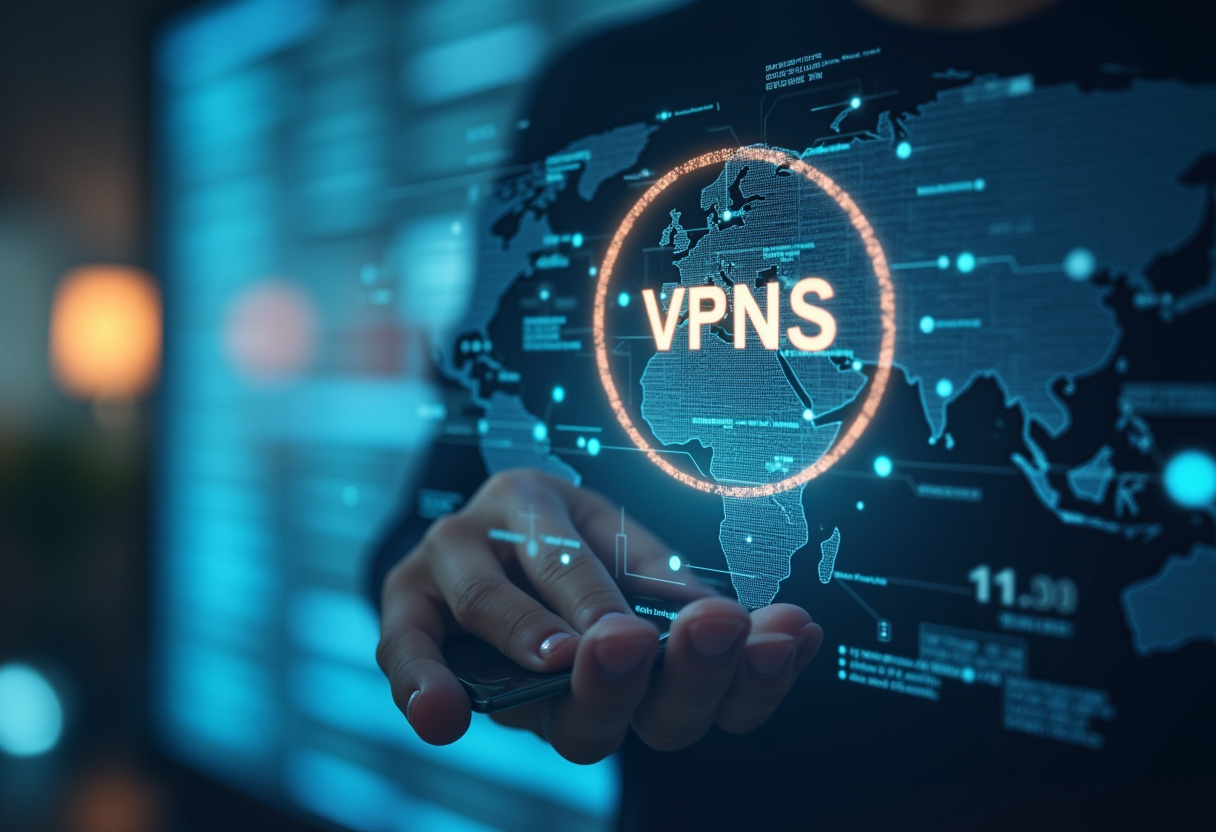VPNs for Language Translation Services: Ensuring Client Privacy

Table of Contents
The Imperative of VPNs in Protecting Sensitive Translation Data
In the intricate dance of global communication, language translation services stand as vital conductors, orchestrating understanding across linguistic divides. However, this delicate process often involves the handling of highly sensitive client information, placing a significant onus on translation agencies and freelance translators to prioritize security and privacy. In an era where data breaches are increasingly common, and the value of confidential information continues to soar, simply providing accurate translations is no longer sufficient.
Clients demand assurance that their documents, data, and communications are shielded from unauthorized access, interception, or manipulation. This is where the implementation of a Virtual Private Network (VPN) becomes indispensable, acting as a robust shield, safeguarding sensitive information as it traverses the digital landscape. This article delves into the crucial role of VPNs in language translation services, exploring how they ensure "client privacy," bolster "document security," and maintain "data integrity." The use of a "translation VPN" is not merely a value-added service, but a fundamental necessity for translation agencies and freelance translators alike, particularly when dealing with highly sensitive materials such as legal contracts, financial statements, medical records, intellectual property filings, and classified government documents.
These types of documents often contain personally identifiable information (PII), trade secrets, or other confidential data that could have significant financial or legal ramifications if compromised. The growing awareness of data breaches, coupled with increasingly stringent data protection regulations like GDPR and CCPA, has heightened the importance of "client privacy" and security. Translation professionals are now expected, and often legally obligated, to implement appropriate technical and organizational measures to protect the confidentiality and integrity of their clients' data.
A VPN addresses a core set of security concerns by establishing a secure, encrypted connection between the translator's device and the internet. This encrypted tunnel effectively masks the translator's IP address and geographical location, making it more difficult for malicious actors to track their online activity or identify their physical location. Furthermore, the VPN routes internet traffic through a secure server, often located in a jurisdiction with strong data protection laws, further enhancing privacy and security.
This added layer of protection prevents unauthorized parties from eavesdropping on communications, intercepting sensitive documents during transmission, or manipulating data in transit. The adoption of a secure "VPN for services" not only safeguards the confidentiality of client documents but also reinforces the professional integrity and trustworthiness of the translation provider. Demonstrating a proactive approach to data protection builds strong client relationships based on trust and confidence, a critical differentiator in a competitive market.
Clients are more likely to entrust their sensitive information to a translation service that can demonstrably demonstrate a commitment to security and privacy. This trust, in turn, fosters long-term partnerships, strengthens client loyalty, and provides a competitive advantage over providers who neglect these critical aspects of their business. Implementing a VPN should be considered part of a broader, holistic security strategy that encompasses other crucial elements.
Strong password management practices, multi-factor authentication, regular security audits, employee training on data protection best practices, and robust access controls all contribute to creating a comprehensive security posture. By combining these measures, language translation services can create a secure and reliable environment for handling confidential information, ensuring that "document security" is always paramount, and "data integrity" is maintained at every stage of the translation process. Choosing an appropriate VPN solution requires careful consideration of several factors, including encryption strength, server location options, the provider's logging policy, and the ease of use of the VPN software or application.
Translation agencies should select a VPN provider with a proven and verifiable track record of security and reliability, one that adheres to strict privacy policies and undergoes regular third-party security audits to validate its security claims. In conclusion, a VPN is an indispensable tool for language translation services seeking to protect the privacy of their clients and ensure the security of their data. By prioritizing the implementation of this technology and integrating it into a broader security strategy, translation professionals can create a secure and trustworthy environment for handling sensitive information and build strong client relationships based on trust and integrity, assuring clients that their valued data is protected at every stage of the project.
The unwavering commitment to "client privacy" stands as the ethical and legal bedrock of any reputable language translation service. In an era defined by escalating data breaches and increasingly sophisticated cyber threats, translation professionals must proactively champion the cause of data protection, exceeding mere compliance and embedding privacy as a core tenet of their operations. This necessitates more than simply implementing technical safeguards like VPNs; it requires cultivating a deep-seated culture of privacy awareness and transparency throughout the organization, coupled with readily accessible and easily understood privacy policies.
A comprehensive privacy policy serves as a vital touchstone, clearly articulating the types of data collected from clients, the specific purposes for which this data is processed, the methods employed for secure storage and protection, and the circumstances under which data may be shared with third parties, such as subcontractors or language technology providers. Crucially, the policy must also delineate the client's rights with respect to their personal data, including the right to access their information, rectify inaccuracies, request deletion of their data, and object to specific processing activities. Furthermore, these rights must be easily exercisable, with clear instructions and readily available channels for clients to make requests.
The implementation of a "translation VPN" constitutes a critical operational safeguard within a comprehensive privacy framework. By encrypting all data transmitted between the translator's device and the internet, a VPN effectively creates a secure tunnel, rendering intercepted data unintelligible to unauthorized parties. This is particularly crucial when handling projects for clients operating within highly regulated industries, such as healthcare (HIPAA compliance), finance (GDPR, CCPA compliance), and law (attorney-client privilege), where the protection of confidential and sensitive information is not only ethically imperative but also legally mandated, carrying significant penalties for non-compliance.
Beyond the technical realm, fostering a robust privacy culture within the translation agency is paramount. This entails comprehensive and ongoing training programs for all employees, equipping them with the knowledge and skills necessary to handle sensitive data responsibly. Employees must be trained on data security best practices, including password hygiene, recognizing and responding to phishing attempts, and adhering to strict data handling protocols.
Furthermore, the implementation of stringent access controls is essential to restrict access to sensitive information, ensuring that only authorized personnel have access to the data required to perform their assigned tasks. Regular security audits, conducted by internal or external experts, should be implemented to assess the effectiveness of existing security measures, identify vulnerabilities, and recommend corrective actions to strengthen the overall security posture. Moreover, translation professionals must exercise caution when utilizing cloud-based translation management systems (TMS) and machine translation (MT) tools.
While these platforms offer undeniable benefits in terms of efficiency and collaboration, they also introduce potential security risks. It is vital to thoroughly evaluate the security features of any cloud-based platform, ensuring that it complies with relevant data protection regulations and implements robust security measures, such as encryption at rest and in transit, access controls, and regular security updates. The use of a "VPN for services" proves invaluable in mitigating these risks, establishing a secure, encrypted connection to cloud platforms, thereby minimizing the potential for data interception or unauthorized access.
In addition to protecting client data, employing a VPN can also bolster the privacy of the translator themselves. By masking their IP address and location, a VPN thwarts the tracking of their online activities and protects them from potential cyberattacks, especially critical for freelance translators often working from public Wi-Fi networks, which are notoriously vulnerable to security breaches. Maintaining "data integrity" is equally essential, safeguarding against data corruption or unauthorized alteration.
A VPN ensures the safe and unaltered transit of data, upholding the fidelity of the original information, particularly crucial in legal or technical translations where precision and accuracy are paramount. In conclusion, prioritizing "client privacy" transcends mere legal compliance; it underscores a profound commitment to ethical conduct and professional responsibility. By adopting a comprehensive privacy strategy encompassing a "translation VPN," transparent privacy policies, and a deeply ingrained privacy culture, language translation services foster unwavering client trust, solidify their reputation for integrity, and establish a competitive edge in an increasingly security-conscious market.
"Document security" is not simply a procedural checkbox to be ticked off; it is the very foundation upon which trust is built between language translation services and their clients. The handling of sensitive client materials demands a proactive and multifaceted approach, incorporating both technical safeguards and robust protocols to protect against unauthorized access, modification, destruction, or disclosure. A VPN acts as a crucial component in this security ecosystem, contributing significantly to the encryption of data both while it is being transmitted (in transit) and when it is stored (at rest).
This dual-layered encryption ensures that even if a document were to be intercepted or accessed by an unauthorized party, its contents would remain unreadable and unusable without the necessary decryption key, which is only accessible to authorized personnel within the translation service. The implementation of a "translation VPN," therefore, serves as a vital first line of defense against potential data breaches. However, a VPN alone is not sufficient to guarantee complete document security.
It must be integrated into a broader, more comprehensive security framework that includes a range of complementary measures, such as stringent password policies, multi-factor authentication, role-based access controls, regular security audits, and comprehensive employee training. Robust password policies are essential for preventing unauthorized access to documents and systems. These policies should mandate the use of strong, complex passwords that are difficult to guess or crack, require regular password changes, and prohibit the reuse of passwords across different accounts.
Multi-factor authentication (MFA) adds an extra layer of security by requiring users to provide multiple forms of identification before gaining access to sensitive documents and systems. This could include something they know (a password), something they have (a security token or smartphone app), or something they are (a biometric identifier, such as a fingerprint or facial recognition). Role-based access controls (RBAC) restrict access to documents and systems based on the principle of least privilege, meaning that users should only have access to the resources they need to perform their job duties.
This helps to prevent unauthorized access to sensitive information and limit the potential damage caused by a security breach. Regular security audits, conducted by independent security experts, can help to identify vulnerabilities in the translation service's security posture and recommend corrective actions. These audits should include penetration testing, vulnerability scanning, and a review of security policies and procedures.
Comprehensive employee training on data security best practices is crucial for creating a security-conscious culture within the translation service. Employees should be trained on topics such as password security, phishing awareness, malware prevention, and data handling procedures. In addition to these technical and procedural measures, it is also essential to establish clear security protocols for handling documents throughout the translation process.
This includes procedures for receiving documents from clients, storing documents securely, tracking document versions, sharing documents with translators, and destroying documents when they are no longer needed. When receiving documents from clients, translation services should use secure file transfer protocols, such as SFTP or HTTPS, and scan all incoming files for malware. Documents should be stored in encrypted repositories, with access restricted to authorized personnel.
Version control systems should be used to track changes to documents and ensure that only the latest version is being used. When sharing documents with translators, translation services should use secure communication channels, such as encrypted email or secure messaging apps. Finally, when documents are no longer needed, they should be securely destroyed, either by shredding paper documents or securely erasing electronic files.
A vital aspect of maintaining "data integrity" is ensuring that the translated document accurately reflects the source document without any unauthorized modifications. A "VPN for services" can ensure the secure transmission of these documents, minimizing the possibility of malicious interference. In conclusion, "document security" is a multifaceted and ongoing process that requires a combination of technical safeguards, robust protocols, and a security-conscious culture.
By implementing a comprehensive document security strategy that includes a "translation VPN" and other best practices, language translation services can protect their clients' sensitive information and build a reputation for trustworthiness and reliability.
Upholding "data integrity" throughout the entire translation lifecycle is paramount, ensuring that the translated content retains the accuracy, completeness, and consistency of the original source material, free from any unauthorized alterations, corruption, or loss. This principle transcends mere linguistic equivalence; it demands that the translated document conveys the same meaning, context, and intent as the original, a critical aspect particularly in specialized fields such as legal, medical, financial, and technical translation, where even minor discrepancies can have significant consequences. Maintaining "data integrity" requires a multi-pronged approach encompassing secure data handling practices, robust quality assurance processes, and the deployment of technologies like VPNs to safeguard data during transmission and storage.
The first step in ensuring "data integrity" is to establish secure data handling practices from the moment the source document is received from the client. This involves using secure file transfer protocols (SFTP, HTTPS) to prevent interception during transit, and storing the document in an encrypted repository with restricted access controls. Throughout the translation process, version control systems should be used to track changes to the document and ensure that translators are always working with the latest version.
Translation memory (TM) systems, which store previously translated segments, can also help to maintain consistency and accuracy across projects. The implementation of robust quality assurance (QA) processes is equally critical. These processes should include multiple stages of review and editing, performed by qualified linguists with expertise in the subject matter.
QA checks should focus on verifying the accuracy of the translation, identifying any errors or omissions, and ensuring that the translated content adheres to the client's style guidelines and terminology preferences. Automated QA tools can also be used to identify potential errors, such as inconsistencies in terminology, grammatical errors, and formatting issues. The importance of using a "translation VPN" cannot be overstated in the context of maintaining "data integrity." By encrypting all data transmitted between the translator's device and the translation service's servers, a VPN prevents unauthorized parties from intercepting and tampering with the document during transit.
This is particularly crucial when translators are working remotely or using public Wi-Fi networks, which are often vulnerable to security breaches. Furthermore, a VPN can also help to protect against man-in-the-middle attacks, where hackers intercept communications between the translator and the server and inject malicious code or alter the document. In addition to protecting data during transit, it's also essential to secure data at rest.
This involves encrypting the storage devices used to store the document, such as hard drives and USB drives. Encryption helps to prevent unauthorized access to the document even if the device is lost or stolen. Secure deletion practices are also crucial.
When a document is no longer needed, it should be securely deleted, either by overwriting the data with random characters or by physically destroying the storage device. Simple deletion, such as dragging the document to the recycle bin, is not sufficient, as the data can still be recovered using data recovery software. When using external services such as cloud storage, the use of a "VPN for services" adds a layer of security that protects "document security" and the "client privacy".
Regular backups are essential for protecting against data loss due to hardware failures, software errors, or other unforeseen events. Backups should be stored securely, preferably in a separate location from the original data. In the event of data loss, backups can be used to restore the document to its original state.
To ensure "data integrity", metadata such as the creation date, modification history, and author information must also be preserved during the translation process, as this metadata can provide valuable context and information about the document's provenance. In conclusion, maintaining "data integrity" is a complex and ongoing process. Translation services should invest in the technologies, policies, and procedures necessary to safeguard data throughout the entire translation lifecycle.
By prioritizing "data integrity," translation services can demonstrate their commitment to quality and build trust with their clients. The implementation of a "translation VPN" is a fundamental building block in this process.
Selecting the optimal "VPN for services" within the language translation industry necessitates a careful, informed decision-making process, taking into account a variety of factors to ensure the chosen solution effectively addresses the specific security and privacy requirements of the business. It's crucial to understand that not all VPNs are created equal; significant differences exist in terms of security protocols, server infrastructure, logging policies, jurisdictional considerations, and overall performance, all of which can impact the level of protection afforded to sensitive client data. The most critical aspect to evaluate is the VPN's encryption strength.
The gold standard is generally considered to be Advanced Encryption Standard (AES) with a 256-bit key (AES-256), which provides an extremely robust level of security, virtually impervious to brute-force attacks. Ensure the VPN provider utilizes this or similarly strong encryption algorithms to protect data in transit. Furthermore, scrutinize the VPN's protocols.
OpenVPN is widely regarded as a secure and reliable protocol, known for its open-source nature and consistent security updates. Other protocols, such as WireGuard, are gaining popularity due to their speed and efficiency, but it's important to research their security track record thoroughly before relying on them. Avoid outdated or less secure protocols like PPTP.
Server location is another important consideration. Ideally, the VPN provider should offer a wide range of server locations, allowing translators to connect to servers in jurisdictions with strong data protection laws, such as those within the European Union, which are subject to GDPR. This can provide an added layer of legal protection for client data.
However, be mindful of potential latency issues associated with connecting to servers located far from the translator's physical location, which can impact translation speed and efficiency. A VPN provider's logging policy is paramount. A strict "no-logs" policy, meaning the provider does not collect or store any data about users' online activities, is highly desirable.
This ensures that even if the VPN provider is compelled by law enforcement to provide user data, they would have nothing to hand over. Carefully review the VPN provider's privacy policy to understand their data collection practices and ensure that they are transparent and aligned with your privacy expectations. Jurisdictional considerations are also crucial.
VPN providers based in countries with strong data protection laws and a commitment to internet freedom are generally preferred. Avoid providers based in countries with extensive surveillance programs or those known to share data with other governments. Performance is a key factor that can impact the efficiency of the translation process.
Choose a VPN provider with a fast and reliable server infrastructure to minimize latency and ensure smooth data transfer. Look for providers that offer unlimited bandwidth and data transfer to avoid any restrictions on usage. Ease of use is important, especially for translators who may not be technically inclined.
The VPN software or app should be intuitive and easy to use, with clear instructions and helpful customer support. Finally, consider the VPN provider's reputation and track record. Read reviews from other users, consult with security experts, and research the provider's history of security breaches or privacy violations.
A provider with a long-standing reputation for security and reliability is generally a safer choice. In conclusion, selecting the right "VPN for services" requires a comprehensive evaluation of various factors, including encryption strength, protocols, server locations, logging policies, jurisdictional considerations, performance, ease of use, and reputation. By carefully considering these factors, language translation services can choose a VPN solution that effectively protects client data and maintains the integrity of the translation process.
Remember that investing in a robust VPN solution is an investment in client trust and the long-term success of your business. Furthermore, coupling the "translation VPN" with data loss prevention measures adds security and ensures "client privacy".
Stay Updated
Get the latest VPN news, tips, and exclusive deals to your inbox.




